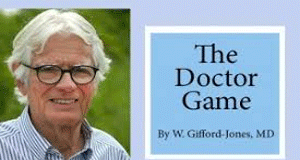Woody Allen, when asked for his opinion about death, replied, “I don’t worry about dying, I just don’t want to be there when it happens!” Unfortunately, Allen will be there and so will the rest of us. This week, why I have a personal interest in the end of life. And what can we all do to provide the best of care to loved ones near death?
Years ago I conducted a five-year battle to legalize heroin to ease the agony of dying cancer patients. Readers, at that time, sent me funds to help with costs. Finally, when heroin was legalized in 1998, $450,000 was left in the kitty which I donated to the University of Toronto, Faculty of Medicine, to establish the Gifford-Jones Professorship in Pain Control and Palliative Care. For an update of the current situation, I recently interviewed Dr. Jeff Myers, the current Professor of Palliative Care.
The Doctor Game
Dr. Myers and his colleagues have not been idle. Today, many doctors are being trained in palliative care. There are now more hospital beds to care for dying patients along with better symptom control. But some “ifs” remain.
I asked Dr Myers what was the stumbling block surrounding palliative care. He replied, “the reality is, 100 percent of us will eventually die. So faced with this indisputable fact we must ensure we depart in the most humane way possible.” This means total and effective palliative care for every person.
Myers reported one shocking problem. Some doctors are not providing adequate painkillers, even when patients have only a short time to live, for fear of causing addiction! This reasoning boggles my mind as years ago I heard this same asinine argument when I was trying to legalize heroin for patients in agony at death’s door.
Dr. Myers is concerned this reluctance will be compounded by the current epidemic of opioid drug deaths. Since doctors are being blamed for causing this problem by over-prescribing opioids, they may be less likely to prescribe them to dying patients. But from my research dying patients do not become addicted to painkillers when they are used for pain. Addiction occurs when drugs are used repeatedly for pleasure. So let’s stop blaming doctors for all of the opioid deaths.
Another major obstacle according to Dr. Myers is that medical students get very few hours of training in palliative care. This is concerning, given the universal need.
Today the Supreme Court of Canada and some US states have declared a legal right to request doctor assisted death. But we do not have a right to adequate palliative care!
The brutal truth is that for the majority of people palliative care is not an option as it is just not available. For example, today 40 percent of cancer patients do not get palliative care during their final year of life. And in some areas of the country less than half of those who die in a hospital receive palliative care.
The problem will get worse as today 80 percent of patients being treated in palliative care facilities are suffering from cancer. Since we are an aging population the demand for palliative care centers will increase.
Dr. Francis W. Peabody, professor at The Harvard Medical School, is remembered for his remark, “The secret of caring for the patient is caring for the patient”. There is no better example than caring for loved ones at the end of life.
So what can be done to assure we leave this planet with the least possible trauma? The primary need is to fund the training of doctors and other medical personnel in palliative care.
If you feel this plea for better palliative care strikes a chord, send a donation to Gifford-Jones Professorship in Pain Control and Palliative Care, University of Toronto. Queen’s Park Crescent West, Toronto, ON, M5S 3H2 or call 1-416-978-7898. You can also give online by clicking here: https://donate.utoronto.ca/give/show/97
Like Woody Allen we’d all prefer not to be there when death occurs. But unless we quickly discover Ponce de Leon’s Fountain of Youth, you can be assured you will be there sooner or later.
— W. Gifford-Jones, MD
 TheBulletin.ca Journal of Downtown Toronto
TheBulletin.ca Journal of Downtown Toronto
